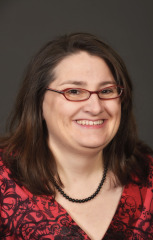 An assistant professor in the Department of Curriculum and Instruction/Literacy Studies is West Virginia University’s most recent recipient of the National Science Foundation’s Career Award.
An assistant professor in the Department of Curriculum and Instruction/Literacy Studies is West Virginia University’s most recent recipient of the National Science Foundation’s Career Award.
Melissa Luna is the first faculty member from the College of Education and Human Services to receive this honor, which is given to outstanding junior faculty members whose proposed research will contribute to NSF’s mission to broaden STEM participation in underserved areas of the country. The accompanying grant, totaling nearly $800,000 over five years, will be used to further Luna’s research regarding elementary science education.
Luna plans to work closely with six elementary schools in West Virginia, where she will investigate fifth-grade teachers’ knowledge of noticing students’ thinking. According to Luna, teachers are key in supporting children’s thinking and understanding—in science classrooms when teachers listen and respond to the things children say and do, children are better able to make sense of phenomena in the world.
“I care deeply about what happens in elementary classrooms in terms of science teaching and learning,” Luna said. “Children are thinkers. They have ideas about the ‘hows’ and ‘whys’ in the world. When kids observe and investigate their world, their ideas and thinking become evident, but also their thinking evolves.”
Luna said that while educators agree that teachers’ attention and responsiveness to their students’ thinking is important, what teachers notice and what knowledge they draw on when doing so is little understood.
To fill that knowledge gap, Luna will use wearable technology to capture teacher noticing in action. By attaching a small video camera to the bill of a hat, Luna will help participating teachers record a constant audiovisual stream of their science teaching practices—while they plan and teach lessons, and while they assess their students’ work. She will also ask teachers to hold a small remote and press the button whenever they notice students’ ideas and thinking. This will create a digital marker on the video footage, thus providing data of teachers’ in-the-moment noticing of their students’ thinking.
Luna will then model the specialized teacher knowledge involved, and design teacher learning materials informed by the model. These outcomes will serve as a foundation for Luna’s larger research agenda in which she plans to test and refine the model and instructional materials in other contexts in order to contribute to a practice-based theory of teachers’ knowledge of noticing students’ thinking in science that can inform and impact science teaching practice in West Virginia and beyond.
This research, set to begin in July 2016, could not come at a more appropriate time. According to Luna, the state of West Virginia will implement new science standards for the 2016-2017 school year. With these new standards in place, Luna believes the emphasis in science education will shift away from science simply as a body of knowledge to learn to a more active approach: engaging in authentic practices of science and engineering to make sense of how the physical/natural world works.
“Professor Luna is an outstanding educator and scholar,” said Gypsy Denzine, dean of the College of Education and Human Services. Denzine added that Luna’s research project “engages West Virginia science teachers in a five-year collaborative project that will have a positive impact on student learning. Her work is highly innovative and lies as the very core of West Virginia University’s land-grant mission. Professor Luna’s expertise is a tremendous asset to our College of Education and Human Services as we prepare outstanding science teachers for West Virginia schools.”
Luna earned a B.S. in Elementary Education from Valparaiso University before becoming a fourth grade teacher. She became increasingly curious about how teachers think about science teaching and learning and about how to support teachers in learning to teach science more effectively. Addressing this led Luna to earning an M.S. in Environmental Education from Lesley University and a Ph.D. in the Learning Sciences from Northwestern University.